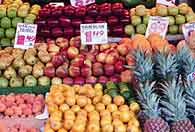Magic Bullet Supplements Unlikely to Prevent Cancer Whole Foods Best Protection, Interaction of Nutrients

March 6, 2000. WASHINGTON, DC -- Concerned that the public may be misled by recent reports showing that isolated nutrients do not provide cancer protection, the American Institute for Cancer Research (AICR) today stressed the interactive nature of cancer-fighting substances in fruits, vegetables, whole grains and beans. The vitamins, minerals and phytochemicals found in these foods work together in complex ways to fight cancer, researchers said.
In the last month alone, the findings of two or three single-agent studies have been widely reported. A Dutch study found no link between vitamins and dietary fiber upon stomach cancer. According to a study in the Journal of the National Cancer Institute, beta-carotene pills afford no protection against cancer. And a study of soy pills for hot flashes in women with breast cancer found no positive results.
"The failure of these single-agent studies may cause people to lose sight of the central concept behind the research. That concept is synergy, by which different substances work together to produce a considerably stronger effect than they could individually," said Ritva Butrum, Ph.D., Vice-President of Research at AICR.
Trials focusing on single substances often show little or no protective effect. But the protective effects of such substances in combination with other compounds found in a healthy plant-based diet have been extensively documented, Butrum said.
An AICR report entitled Food, Nutrition and the Prevention of Cancer:
A Global Perspective examined over 4,500 international studies on the
link between diet and cancer. The report found convincing evidence
that a predominantly plant-based diet rich in a variety of fruits,
vegetables, whole grains and beans significantly reduces cancer risk.
Ultimately, researchers hope to determine how the many substances in
these foods work in combination. After mapping out these important
synergistic effects, they will be able to design healthy diets rich
in foods that interact with each other for optimal disease-fighting
benefits.
"Future cancer-fighting efforts are more likely to revolve around dietary adjustments than miracle pills," said Dr. Butrum. "These single-agent studies are the means to an end, not the end itself. They provide information that will allow us to enhance the anti-cancer benefits of healthy diets."
Finding Our How Foods Interact
Laboratory tests have already taught scientists a great deal about the interaction of health-promoting substances. In tissue studies, the anti-cancer actions of natural compounds found in garlic (called allyl sulfides) are significantly enhanced in the presence of selenium and vitamin A.
Studies show that vitamin A exerts a protective effect against cancers, but other nutrients must first help to convert the carotenoids in food to vitamin A. In animal tests, subjects consuming diets lacking in selenium and vitamin E were less able to form vitamin A from carotenoids and showed increased cancer risk.
Dangers of the Magic Bullet
In some cases, very high doses of an isolated dietary substance may be toxic. Fatigue, diarrhea and hair loss are possible side effects of over-supplementation, but more serious problems may also occur: kidney stones, liver or nerve damage, even death. That's another reason scientists are concentrating on an approach to cancer prevention that involves the overall diet.
Researchers express concern about high-dose single-agent nutritional supplements and about commercial development of transgenic foods featuring unnaturally high levels of nutrients and other plant compounds. They are beginning to caution the food industry that substances which are beneficial at normal dietary levels may show unknown effects when delivered in megadoses by foods that have been genetically altered.
The American Institute for Cancer Research [http://www.aicr.org] focuses exclusively on the link between diet and cancer. The Institute, a charity, provides a wide range of consumer education programs to help Americans learn to make dietary changes for lower cancer risk. AICR also supports innovative research in cancer prevention and treatment at universities, hospitals and research centers across the U.S. The Institute has provided over $50 million in funding for research in diet, nutrition and cancer.
![]()


